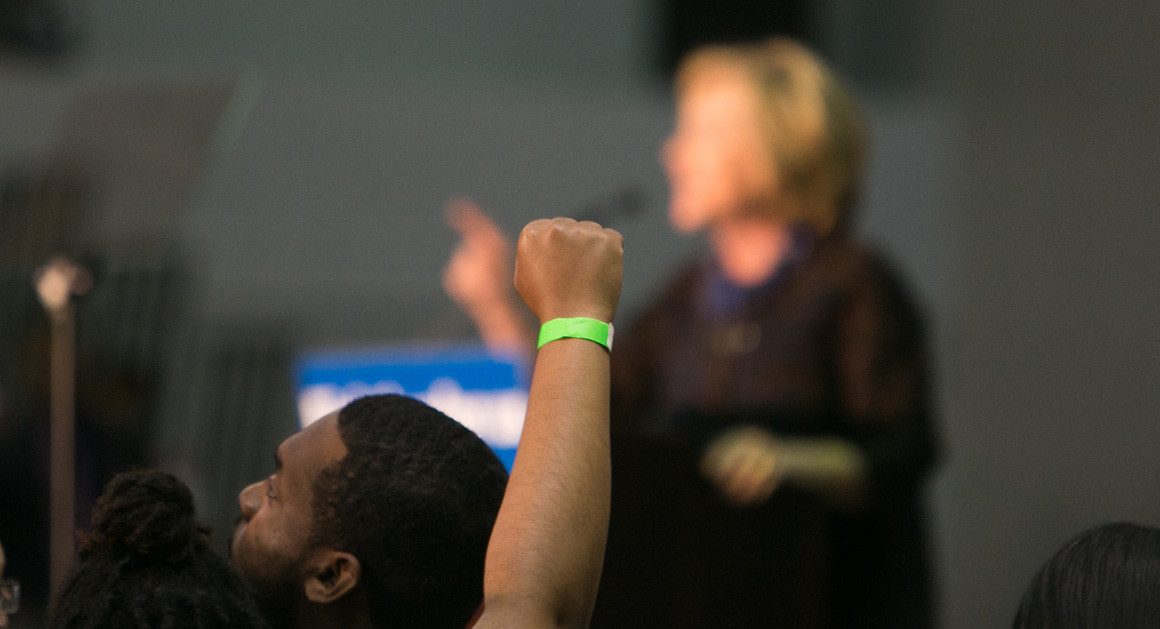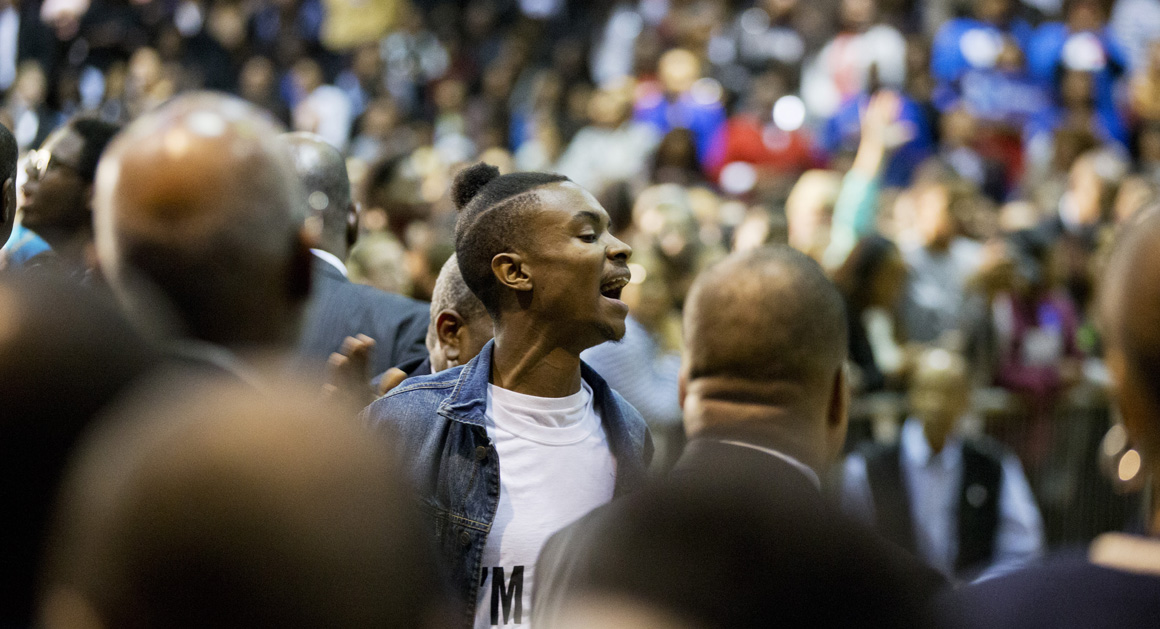
ATLANTA -- The campaign was set on letting the protesters have their voices heard -- even if it meant their chants of “Black Lives Matter” drowned out the words of Hillary Clinton, who traveled to Atlanta Friday afternoon to discuss race with African American voters.
Standing on stage with Georgia Rep. John Lewis, Clinton attempted to pay homage to him and other leaders of the civil rights movement, recounting her own brief meeting as a Chicago teen with Martin Luther King, Jr. -- but the new generation of black activists had little interest in dwelling on the past.
“Black! Lives! Matter!” a rowdy group of about a dozen protesters began chanting near the top of Clinton’s remarks, their voices carrying through the gymnasium and overwhelming hers.
“Yes, they do, and I'm going to talk a lot about that in a minute,” Clinton said. “Now, my friends, I am going to get to some very important points that actually prove that black lives do matter and we have to take action together…. But I want to recognize some of the women who were in the head of the civil rights movement back in the 1960s.”
The protesters lasted for about 15 minutes before they were escorted out of the gymnasium -- what felt like an eternity as Clinton tried to plow through her speech without being distracted by the voices drowning her out.
The scene that unfolded in the gymnasium at Clark Atlanta, a historically black university, demonstrated the challenge Clinton faces of winning over a new generation of African American voters who feel disenfranchised -- even with the help of the old guard standing by her side.
Clinton began her day in Atlanta at the Hyatt Regency downtown, where she made a brief appearance at Rev. Jesse Jackson’s Rainbow Push Coalition luncheon; she received a warm welcome from the crowd, where the average age was well over 60. But Jackson, like Lewis, is a longtime Clinton ally -- one of the few black leaders who endorsed her in 2008 instead of backing Barack Obama. His support, which has been constant, did little to show that any wounds from the racial tensions on the 2008 campaign trail have been healed, or to help Clinton score points with young black voters.
"The challenge and opportunity is how to be the heir after the first black president,” said Michael Blake, who worked as an organizer on Barack Obama’s 2008 campaign and now serves as an Assemblyman in New York. “Any African American has experienced, directly or indirectly, someone saying something that was dismissive of them. The key for her right now is telling a story -- here’s why I will be better. Here's how I will stand up. That story has to be about today’s issues and is going to come down to criminal justice and economics. Black folks are not just going to show up just because someone is a Democrat and just because of a name. People need to feel the energy of, ‘why do I have to do this?’”
On Friday afternoon, at a raucous 2,100-person rally to kick off “African Americans for Hillary,” much of the crowd appeared moved by the proposals Clinton unveiled.
“Let! Her! Speak!” the gymnasium yelled, trying to silence the small group of protesters who were overshadowing her. At times, the entire gymnasium erupted in cheers of “Hillary! Hillary! Hillary!” which left the candidate grinning and taking it in on the stage.
"I will make sure that federal funds for state and local law enforcement are not used to buy weapons of war that have no place on the streets of our country,” Clinton said to loud cheers, after the protesters had been escorted out of the gym. “I will also work to make sure every police department in the country has body cameras that will help protect good people on both sides of the lens.” Clinton also reiterated her call to end the era of mass incarceration, and called to ban racial profiling by law enforcement. “It is wrong,” she said. “It is demeaning, and it does not keep us safe or help solve crimes.”
The generational divide was on display in the gym, where older attendees said they were not impressed by the grandstanding that stole the attention from Clinton’s speech. “You can definitely appreciate when young people want to take a political stance,” said Alexis Davis Smith, who runs a public relations firm in Atlanta. “However, it’s traditional to protest against someone who is against your issue. While I admire their courage, this wasn’t the forum and this wasn’t the person. They were preaching to the choir.”
Smith said she was moved by Clinton’s commitment to the issues and that she has been a fan for years, even though she supported Obama in 2008. “I voted for her husband partially because I liked her,” she said.
Lewis, who tried to calm the protesters down, said after the rally: “They represent another time, another era. They were trying to make a point, to dramatize what they’re concerned about.”
The students in attendance were less interested and many began wandering out before Clinton concluded her remarks. “We’re just hungry and my feet are hurting,” one young woman who declined to give her name said as she headed for the door. Outside the rally, Usher, who was in attendance, also spoke with the protesters, according to a campaign aide. But Clinton left for her next campaign stop in South Carolina without running into them again before she left.
Clinton's acknowledgement that "America's long struggle with race is far from finished" was greeted with applause. She named the young African Americans "cut down too young," like Walter Scott, Tamir Rice, Eric Garner, Freddie Gray and Sandra Bland.
But outside of the gymnasium where she spoke, leaders of the larger African American community said they still have questions. “What kind of attorney general would she have?” Rev. Al Sharpton said in an interview. “Would she be aggressive on our issues? Especially with the backdrop of a lot of these sentencing laws started under the former Clinton administration, she’s got to deal with that. She’s got to really deal with economic development, in terms of jobs, in terms of racial bias in jobs.”
Clinton has sat for two interviews with Sharpton since launching her campaign. But Sharpton, who prides himself on a close relationship with Obama, said he is not yet close to offering his endorsement. “There was hope Joe Biden would get into the race,” he admitted. “He’s considered almost the twin to Obama.”

As for Clinton, he said he is “waiting to hear some aggressive things on what she is going to do on criminal justice matters and how we’re going to deal with racial disparities. The biggest problem she has with black America is that for the first time in American history you’re going to have a white succeeding a black President.”
The Clinton campaign believes it can win over voters by meeting them where they are, according to Marlon Marshall, Clinton's director of state campaigns and political engagement.
“She’s the only candidate to talk specifically about what she'd do on voting rights,” Marshall said in an interview. “That matters for both young African Americans and older African Americans. If we talk about the issues and talk about them in the communities, and meet people where they are, she will continue to earn their support.”
A campaign aides said 120,000 voters have been contacted in South Carolina, with about 1,100 organized events in places like barber shops, beauty salons and churches.
“Building relationships and meeting people where they are,” said Marshall, “is how you get their vote.”
- Publish my comments...
- 0 Comments
